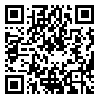دوره 20، شماره 1 - ( 12-1400 )
جلد 20 شماره 1 صفحات 10-1 |
برگشت به فهرست نسخه ها
Download citation:
BibTeX | RIS | EndNote | Medlars | ProCite | Reference Manager | RefWorks
Send citation to:



BibTeX | RIS | EndNote | Medlars | ProCite | Reference Manager | RefWorks
Send citation to:
Imani-Shakibayi M, Zarifian T, Zanjari N. Assessment and Treatment of Childhood Apraxia of Speech: An Inquiry into Knowledge and Experience of Speech-Language Pathologists. Iranian Rehabilitation Journal 2022; 20 (1) :1-10
URL: http://irj.uswr.ac.ir/article-1-1178-fa.html
URL: http://irj.uswr.ac.ir/article-1-1178-fa.html
Assessment and Treatment of Childhood Apraxia of Speech: An Inquiry into Knowledge and Experience of Speech-Language Pathologists. مجله انگلیسی زبان توانبخشی. 1400; 20 (1) :1-10
چکیده: (5937 مشاهده)
Objectives: The present research aims to identify the assessment and treatment processes used by Iranian Speech-Language Pathologists (SLPs) for Childhood Apraxia of Speech (CAS) and investigate the impact of their knowledge level and experience on their choice of assessment and treatment.
Methods: This research is a cross-sectional study using a survey design conducted on 260 SLPs with a minimum of a Bachelor’s degree and at least one year of experience of working with preschoolers. The CAS assessment and treatment were measured by a validated questionnaire, which was completed in person or online.
Results: The tests of Diadochokinesis (DDK) (66%), single-word speech sampling (58.1%), oral-motor assessment (54.6%), and connected speech sample analysis (53.1%) were the popular tests chosen by the participants. The treatment approaches indicated that Oral Motor Exercises (OMEs) (57.7%) were the only treatment for which over half of the participants voted. The experts chose phonologically-based treatments and Integrated Phonological Awareness (IPA), but the less-experienced participants were more interested in PROMPT (prompts for restructuring oral muscular phonetic targets). The majority of the participants (70.8%) believed that children with CAS make very slow progress and 21.9% declared that speech problems of such children persist through the school years.
Discussion: The participants’ choice of assessment tasks is in line with the results of recent studies. However, opting for outdated treatments such as OME indicates a gap between the clinicians’ knowledge and experience in using evidence-based treatments.
Methods: This research is a cross-sectional study using a survey design conducted on 260 SLPs with a minimum of a Bachelor’s degree and at least one year of experience of working with preschoolers. The CAS assessment and treatment were measured by a validated questionnaire, which was completed in person or online.
Results: The tests of Diadochokinesis (DDK) (66%), single-word speech sampling (58.1%), oral-motor assessment (54.6%), and connected speech sample analysis (53.1%) were the popular tests chosen by the participants. The treatment approaches indicated that Oral Motor Exercises (OMEs) (57.7%) were the only treatment for which over half of the participants voted. The experts chose phonologically-based treatments and Integrated Phonological Awareness (IPA), but the less-experienced participants were more interested in PROMPT (prompts for restructuring oral muscular phonetic targets). The majority of the participants (70.8%) believed that children with CAS make very slow progress and 21.9% declared that speech problems of such children persist through the school years.
Discussion: The participants’ choice of assessment tasks is in line with the results of recent studies. However, opting for outdated treatments such as OME indicates a gap between the clinicians’ knowledge and experience in using evidence-based treatments.
نوع مقاله: پژوهشي |
موضوع مقاله:
گفتار درمانی
دریافت: 1399/2/23 | پذیرش: 1399/10/17 | انتشار: 1401/3/11
دریافت: 1399/2/23 | پذیرش: 1399/10/17 | انتشار: 1401/3/11





